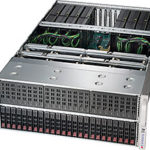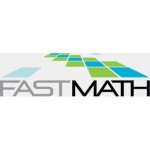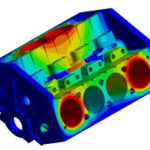Sure, your code seems fast, but how do you know if you are leaving potential performance on the table? Recognized HPC experts Georg Hager and Gerhard Wellein will teach a tutorial on Node-Level Performance Engineering at SC16. The session will take place 8:30-5:00pm on Sunday, Nov. 13 in Salt Lake City.
Archives for September 2016
Supermicro Rolls Out New Servers with Tesla P100 GPUs
“Our high-performance computing solutions enable deep learning, engineering, and scientific fields to scale out their compute clusters to accelerate their most demanding workloads and achieve fastest time-to-results with maximum performance per watt, per square foot, and per dollar,” said Charles Liang, President and CEO of Supermicro. “With our latest innovations incorporating the new NVIDIA P100 processors in a performance and density optimized 1U and 4U architectures with NVLink, our customers can accelerate their applications and innovations to address the most complex real world problems.”
Video: Experiences in eXtreme Scale HPC
In this video from the 2016 Argonne Training Program on Extreme-Scale Computing, Mark Miller from LLNL leads a panel discussion on Experiences in eXtreme Scale in HPC with FASTMATH team members. “The FASTMath SciDAC Institute is developing and deploying scalable mathematical algorithms and software tools for reliable simulation of complex physical phenomena and collaborating with U.S. Department of Energy (DOE) domain scientists to ensure the usefulness and applicability of our work. The focus of our work is strongly driven by the requirements of DOE application scientists who work extensively with mesh-based, continuum-level models or particle-based techniques.”
Bridges Supercomputer to Power Research at North Carolina School of Science and Mathematics
Today XSEDE announced it has awarded 30,000 core-hours of supercomputing time on the Bridges supercomputer to the North Carolina School of Science and Mathematics (NCSSM). Funded with a $9.65M NSF grant, Bridges contains a large number of research-grade software packages for science and engineering, including codes for computational chemistry, computational biology, and computational physics, along with specialty codes such as computational fluid dynamics. “NCSSM research students often pursue interdisciplinary research projects that involve computational and/or laboratory work in chemistry, physics, and other fields,” said Jon Bennett, instructor of physics and faculty mentor for physics research. “The availability of supercomputer computational resources would greatly expand the range and depth of projects that are possible for these students.”
GPUs Power New AWS P2 Instances for Science & Engineering in the Cloud
Today Amazon Web Services announced the availability of P2 instances, a new GPU instance type for Amazon Elastic Compute Cloud designed for compute-intensive applications that require massive parallel floating point performance, including artificial intelligence, computational fluid dynamics, computational finance, seismic analysis, molecular modeling, genomics, and rendering. With up to 16 NVIDIA Tesla K80 GPUs, P2 instances are the most powerful GPU instances available in the cloud.
Supercomputing Experts Lend Expertise to Address STEM Gender Gap
Men still outnumber women in STEM training and employment, and engineering leaders are working to bring awareness to that diversity gap and the opportunities it presents. SC16 is calling upon all organizations to look at the diversity landscape and publish that data. “Of course, we are supporting programs that empower more girls to study and pursue STEM degrees and careers. Getting more girls through the educational and training pipeline is a great first step, but it’s just the beginning.”
Supercomputing Plant Polymers for Biofuels
A huge barrier in converting cellulose polymers to biofuel lies in removing other biomass polymers that subvert this chemical process. To overcome this hurdle, large-scale computational simulations are picking apart lignin, one of those inhibiting polymers, and its interactions with cellulose and other plant components. The results point toward ways to optimize biofuel production and […]
Penguin Computing Adds Remote Desktop Collaboration to Scyld Cloud Workstation
Today Penguin Computing announced Scyld Cloud Workstation 3.0, a 3D-accelerated remote desktop solution which provides true multi-user remote desktop collaboration for cloud-based Linux and Windows desktops. “Unlike other remote desktop solutions, collaboration via Scyld Cloud Workstation is more like sitting in-person with other engineers because a user can hand off control of their desktop to simplify collaboration on a project,” said Victor Gregorio, Vice President and General Manager, Cloud Services, Penguin Computing. “Scyld Cloud Workstation brings collaboration to life, providing a much more thorough and proficient interaction among researchers and engineers working together on a remote desktop. Ultimately, this allows customers a more efficient means to leverage cloud-based desktop solutions.”
SC16 Plenary Session to Focus on HPC and Precision Medicine
SC16 will continue its HPC Matters Plenary session series this year with a panel discussion on HPC and Precision Medicine. The event will take place at 5:30 pm on Monday, Nov 14 just prior to the exhibits opening gala. “The success of all of these research programs hinge on harnessing the power of HPC to analyze volumes of complex genomics and other biological datasets that simply can’t be processed by humans alone. The challenge for our community will be to develop the computing tools and services needed to transform how we think about disease and bring us closer to the precision medicine future.”
Accelerating Finite Element Analysis with Intel Xeon Phi
With the introduction of the Intel Scalable System Framework, the Intel Xeon Phi processor can speed up Finite Element Analysis significantly. Using highly tuned math libraries such as the Intel Math Kernel Library (Intel MKL), FEA applications can execute math routines in parallel on the Intel Xeon Phi processor.










